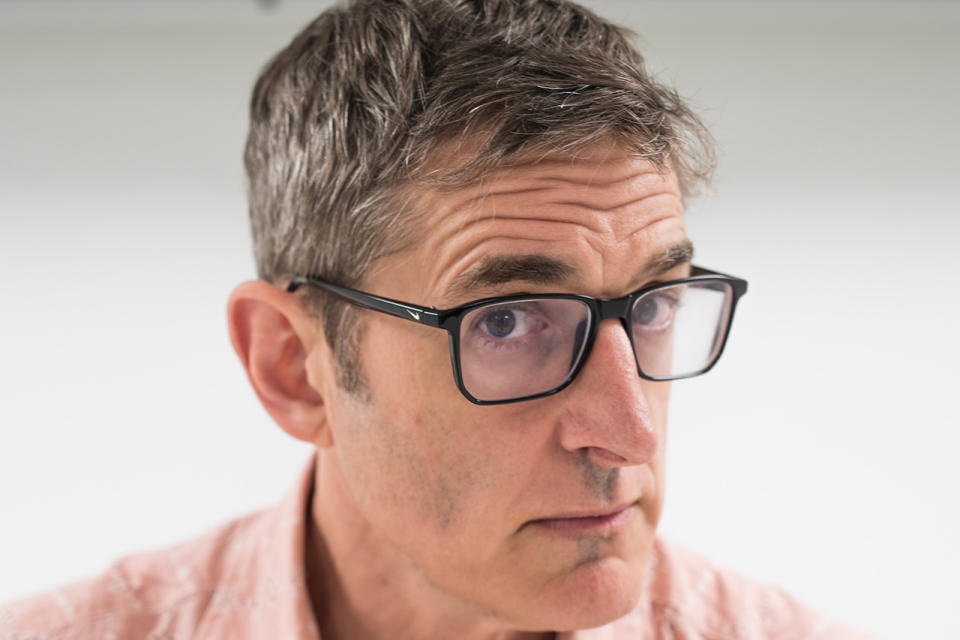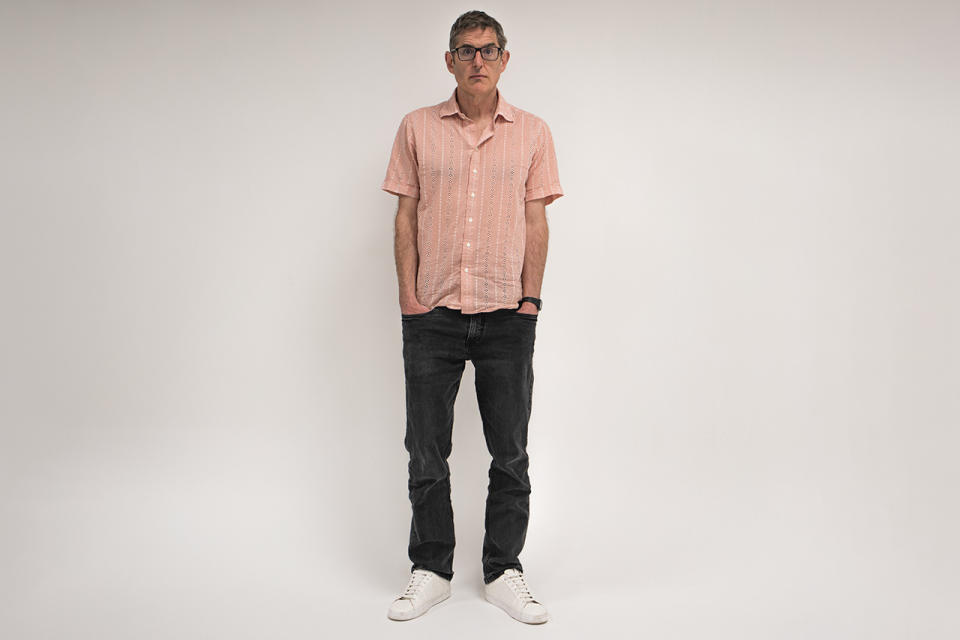After Years of Iconic Interviews, Louis Theroux Now Wants to Redefine Podcasts
Louis Theroux is the definitive interviewer. To be interviewed by him is an honor – few would dare to decline his offer to tell your story. Put simply, storytelling is what he does best; his groundbreaking series Weird Weekends didn’t just redefine the documentary industry, it defined Theroux. Through this, he developed his signature inquisitive yet coy approach, and his oeuvre has become the de facto benchmark of what makes a great story.
Theroux shone a light on “weirdos,” fringe communities, and outsiders. His technique is to make you feel comfortable in his presence, to not push too hard, and to make you feel like he is one of you – only he’s not, and he is interrogating you without you knowing it, thus giving people a platform to express themselves and their ways of life openly, for better or worse.
However, this soon came to a startling halt. Like the rest of the world, Theroux was hugely impacted by the Coronavirus lockdown. He couldn’t travel or see people, so he directed his attention to podcasting. As expected, his first podcast, Grounded, saw him speak to a diverse range of people – FKA Twigs, Frankie Boyle, Ruby Wax, and KSI, to name a few.
Now aged 53, Theroux has fine-tuned his methods into new mediums. In his 20s his innocence was key, in his 50s it’s all about honesty. This is his recipe for telling a compelling story, and the qualities of openness are what drive his new Spotify-exclusive series, The Louis Theroux Podcast.
With the likes of Shania Twain, Tan France, Amelia Dimoldenberg and Craig David all joining Theroux, the new podcast is rich in diverse, frank conversation. Only now, it’s more indulgent and personable than ever before.
To learn more about what’s in store, Hypebeast sat down with Theroux to discuss what makes a good story, what gets him ticking, and why The Louis Theroux Podcast is packed with all the stuff you really want to hear. Here’s what the legend of interviews had to say.

Hypebeast: What makes a good story?
Louis Theroux: For me, it needs a few different qualities. It needs a sense of being at risk.
One of the oldest stories is about slaying a dragon. Slaying a mouse doesn't have the same compelling quality, because mice aren’t frightening. But dragons are. I don't mean to sound basic, but in a sense, whenever I go out and do a story, that idea of there being a level of danger is a big part of it.
The second quality is intimacy. In a sense this is related to risk; a sense of self-exposure, but also the idea that you're seeing it up close in a granular way. If I'm in a prison, you've got the risk, but you've also got the feeling of just the day-to-day dimension of how life is lived and the small details that add up to a compelling picture.
And yet, somehow, you always manage to make it light-hearted!
Humor can't be separated from life and people often get hung up on it… there's nothing funny about such and such, right?
There are qualities of humor to be found everywhere. We have the phrase “Gallows Humor” for a reason. But is it funny? Is someone being hung funny? No. That is not funny. But nevertheless, we alleviate fear and anxiety by cracking jokes, right? That's why people laugh. You know, they're not supposed to. But we laugh at funerals because of that feeling of anxiety, the emotion, but also the feeling of it being forbidden.
I made a program about a maximum-security mental hospital for pedophiles. It was called A Place for Pedophiles. It's difficult to acknowledge, but there are aspects of that experience that had a quality of humor about them. There was a scene where they all got together and sang the theme from The Addams Family because they were celebrating Halloween. It's not like, laugh out loud, “my insides are aching funny.” But there's a queasy comedy in seeing it.
Comedy works really well when you have the visuals of documentaries. How do you get the same level of compelling storytelling through podcasts?
It speaks to what we're just talking about, which is the intimacy of the form. You could be chopping an onion, riding your bike, doing the laundry, and there it is in your ear, and that gives you the space to actually let it unfold at a more relaxed pace.
In this era of what they thought was going to be fast information sound bites, we actually also have the growth of long-form formats. That builds up a sense of relationship – and so much comedy is in small moments of texture.
Jokes can be funny, but often what's funnier to me is the accidental comedy of awkwardness, or just people slightly riffing off each other; the High Wire act of two people trying to negotiate their way around a difficult subject. Does that make sense?
It’s more nuanced.
Yeah. It's like that feeling when someone says, “I want to tell you a joke.” Do you ever get a bit tense? “Oh, I’m not going to find it funny.” Because you feel that, and then I'm not gonna laugh, I'm gonna have to pretend to laugh, I either pretend to laugh and they won't be convincing, or I don't laugh, and they'll be annoyed.
Do you think it’s this kind of nature that gets people hooked on podcasts?
A podcast is just radio on command. But the difference is that it's consumed on demand, so you can choose how and when you listen to it.
"This [new podcast] has a more or less spontaneous intro and outro. It's more of an unfiltered download of what's in my head, my feelings before and after the chat. I think it has a bit more of an intimate quality."
The difference that makes is that it allows for experiences that are more intimate and long-form.
There's a little bit of enjoyable tension as well in the encounter. I'm remembering when I spoke to Samantha Morton, for example. I've got the space to go wherever I want with the chat. I had done my research – she was in one of the biggest Box Office bombs of all time, in a film that very few people, other than myself, had seen called John Carter. By coincidence, I'd seen it, it cost $300 million dollars to make.
I said to her, what about John Carter? She said, “You know, I've never been asked about that before.” A) that's golden when you hear big stars speak on a never-spoken-of subject. B) there's this inherent comedy to the idea that a legendary actor, like Samantha Morton, who's been in films made by some of the greatest directors of our time… but I got to speak to her about this huge flop n which she played a space alien in a film that no one ever went to see.
It's kind of funny because it actually feels faintly disrespectful. But if you do it in a way that feels okay, you're in that intriguing spot of cheeky but lovable.

That’s the stuff we want to hear.
I interviewed Michaela Coel on a podcast a couple of years ago. I was like, “You don't talk about your private life? But can I ask a bit about your private life? I've read that you’re aromantic.” She's like, “Oh, I don't talk about my private life.”
And then there was that awkward pause. And then I just pretended to shuffle my papers, and made a joke out of it. But there's something quite nice, something exquisite about actually kind of slightly f*cking up, and then somehow finessing your way out of it.
By doing so, you build a rapport with that kind of person. Right?
It’s that tension and release. For listeners, they're like, “Oh, this is a bit awkward.” But then if you can glide out of it, you'll get that release, which is enjoyable.
So have you had moments like that on the new podcaster?
Of course, yeah! I go to quite a dark place with Shania Twain.
First of all, she is a complete legend. She looks exquisite and is the kind of consummate pop artist having sold hundreds of millions of records. And I’m just talking to her about some of the most intimate things you could imagine. As she mentioned in her book, she experienced sexual abuse from her father. These are moments where you're sort of tiptoeing up to the material that is extremely fraught and vulnerable.
This approach brings more humanity to it, a better understanding, and it results in indulgent listens.
Yeah, and that is lovely.
This [new podcast] has a more or less spontaneous intro and outro. It's more of an unfiltered download of what's in my head, my feelings before and after the chat. I think it has a bit more of an intimate quality.
Given what’s going on in the world right now, do you think this quality of raw, unfiltered openness is what we need to hear in order to escape?
I think it's a balance, isn't it? I think you want something that's raw and unfiltered, but you also want something that actually has some quality to it. A sense of structure. There’s a fine line between having something organic and raw, and then having it be a big sort of mess on the other hand.
Do you prefer doing podcasts?
With podcasts, I can't surrender and be swept up in the world that I'm in. I also have to do much more preparation. I’ve got two hours, instead of two weeks and two or three filming trips. And that means that the pressure is on, to be totally prepared, be present, and be focused.
As much as I enjoy podcast interviews, I do bring a bit of discipline to my approach. There are a lot of podcasts out there where the person is like: “Oh, tell me about what's going on with you” and “Oh that sounds wonderful!”
It’s slightly unfocused, where it's all friendly, and lovely, and you're brilliant, and I love you. But you don't get the feeling that the questions that you're really interested in are being answered, and there's maybe an unwillingness to go to the normal, difficult, and tender spots.
It's extraordinary to reflect on how many people I’ve interviewed who’ve had experiences of feeling suicidal. I wouldn't say that's common – it may or may not be, I'm not choosing to speculate on that. But I know that Tan France, whom I’ve interviewed, talks about wishing to do himself harm in his book. Craig David talks about it.
There's a level of angst, a deep, deep anguish that people talk about which I get into with them most of the time.
How do you approach these moments?
I'm going to give you a really honest answer. My happy place is still very much going to prison or a hospital.
I don't mean to sound glib about it, but that's where I know that I can just surrender to some human experience of being amongst people and learning the rules of this enclosed world that I'm in. Or even in the kind of extreme religious group or in the world of sex work.
There's something very absorbing about being amongst people who are involved in something and you get to be a spectator.

There’s an ironic quality of mundanity to prison life, religious groups, and porn stars. If it’s all around us, why is it so interesting to us, and to you?
The weirdest thing about weird people is how normal they are.
It goes back to one of my first-ever episodes of Weird Weekends, which was recorded in late 1996. It was a white power compound in Northern Idaho. One of the guys there was one of the leaders of the outfit, and they were this dreadful neo-Nazi group called Aryan Nations.
During the course of the interview, which was about what they believed and why they believe what they believe, he mentioned – I think clocking that I was English – that he was a big fan of British television. In particular, the sitcom Are You Being Served?
It’s a ‘70s/’80s sitcom, set in a department store where one of the main characters is called Mr. Humphries, and all the humor relies on the idea that he might be gay. He goes around saying “I am freeeee” – nothing about that fit with the idea, the profile, of being a neo-Nazi. Nothing about that lines up.
"The weirdest thing about weird people is how normal they are."
Yet, there he was, saying like he loved Mrs. Slocombe with her blue hair. He loved it, he found it very humorous. To me that encapsulated the strangeness of – you mentioned the mundanity – someone being, I suppose… three-dimensional or having a dimension that is utterly unlike the world you think that they should have.
He was trying to bond with me. There's something about when you go amongst people who you've read about in tabloid headlines and then discovering that they are more complicated – not to take anything away from the evil or the poisonous qualities of what they do. It sits alongside contradictory qualities.
I think it gives you the beginnings of the possibility of some sort of redemption, and certainly the beginnings of the possibility of understanding and hopefully, changing people.
The key to your interviews is clearly bonding. What is it that you want to achieve with your new podcast, and what do you want people to get out of it?
I want to make good shows.
The experience I have with a really good podcast, where you're completely absorbed for an hour or two, your cares kind of melt away a bit. Maybe that’s quite a lofty ambition to have, or maybe it isn't, I don't know.
When you have a really good podcast on the go, or a really good TV show or a box set, it gives you that little squirt of pleasure. Knowing that you’ve got another episode to listen to, or to watch; for a minute life becomes slightly better, you've got that pleasure of anticipating, that you're going to experience it and then you surrender to the experience of it.
That's perfection.
The brand new Spotify-Exclusive Podcast, ‘The Louis Theroux Podcast,’ is available to stream now on Spotify, with new episodes landing every Tuesday.

